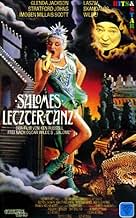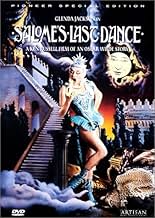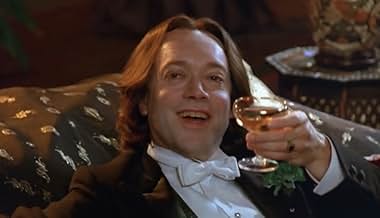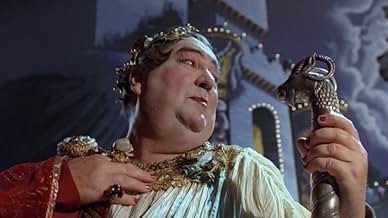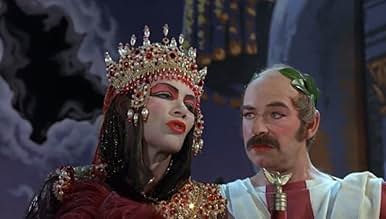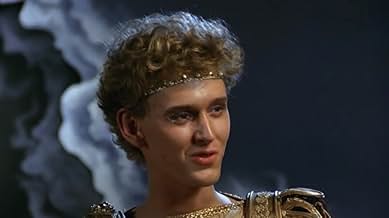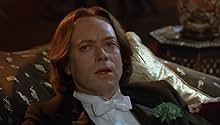IMDb-BEWERTUNG
6,4/10
2099
IHRE BEWERTUNG
Füge eine Handlung in deiner Sprache hinzuOn Guy Fawkes Day 1892 Oscar Wilde goes to a performance of his controversial, banned play 'Salome'. The 'theatre' is a brothel and the performers are prostitutes.On Guy Fawkes Day 1892 Oscar Wilde goes to a performance of his controversial, banned play 'Salome'. The 'theatre' is a brothel and the performers are prostitutes.On Guy Fawkes Day 1892 Oscar Wilde goes to a performance of his controversial, banned play 'Salome'. The 'theatre' is a brothel and the performers are prostitutes.
- Regie
- Drehbuch
- Hauptbesetzung
Ken Russell
- Cappadocian
- (as Alfred Russell)
- …
Empfohlene Bewertungen
Salome's Last Dance is one of those films that will fascinate people or repulse them very like director Ken Russell's directorial style. First viewing I disliked it, seeing it again in a better mood just recently it was much better than remembered, though for me one of Russell's weaker films. A few things stop it from being a masterpiece. Russell does go overboard with the excess at times- not unusual for Russell- and some of those excessive images are disgustingly ugly, especially with Salome licking saliva off her face. Russell also writes himself in an acting role as a photographer and is rather embarrassingly bad and in a somewhat creepy way. Imogen Millais-Scott I had mixed feelings on, she is gorgeous, seductive and age-appropriate, though with a tendency to mug. Even with the excess, Salome's Last Dance does maintain the spirit of Oscar Wilde's play Salome with its beauty and ability to shock. The film is expertly filmed and the production values are a mix of the hypnotisingly beautiful and the decadent, which is hardly inappropriate(Strauss' opera Salome, which I personally love, has those qualities too). The music is a hodgepodge of classical music, and a wonderful hodgepodge at that, Rimsky-Korsakov and especially Debussy the prime composers and they further add to the beautiful yet shocking atmosphere. They are performed very well and mostly fit within the film. The script is witty and uproarious, Herodias has some truly hilarious lines, and the story is interestingly structured with a good touch of the theatrical and the cinematic. You cannot take your eyes away from the dance scene either. Most of the acting is better than its given credit, Glenda Jackson and Stratford Johns especially. Jackson is a little bizarre but also very regal and authoritative and Johns is suitably wry and mischievous, making a potentially tiresome character interesting. Nickolas Grace is a witty Oscar Wilde and Douglas Hodge a mostly effectively warning John the Baptist though he does over-compensate a bit. Overall, easy to see why people will dislike it, it's far from perfect but has interest points and entertainment value. 6.5/10 Bethany Cox
There is never ending debate over the value of work by directors like Russell. He is almost universally written off by professional critics as a mostly sensationalist, tasteless crackpot who's real talent is questionable, yet he is passionately defended by other people and this deserves some comment. Russell's work is often described as "tasteless, vulgar, unrestrained, even misanthropic" and "employing the imagery of sexual excess." One might make a case for the idea that these adjectives describe many fans of Russell's work themselves, or at least that they enjoy these themes in film. The latter is admittedly the case of this author, and unlike many people I certainly feel these are often necessary qualities of good art. Many fans of Russell attempt useless claims that his work is really quite tasteful and not offensive or "over the top" at all, but that would be somewhat inaccurate and in this author's opinion completely missing the point of his work. Compared to normal standards, Russell's films ARE as many critics claim they are, and they will offend people who for the most part should not waste their time viewing his work, and no, offending people is NOT the point of his films, and yes- many nice, healthy, well adjusted people feel his work is fantastic, ingenious and rewarding. Rather than digress into some probably useless philosophical (or political?) arguments over whom is correct or whom is better qualified to comment, it's better that the author's perspective be made clear from the outset. In the end, it might be argued that all ideas about the comparative merits of film or art are pointless, pretentious exercises used to promote arbitrary opinion based on personal taste.
When I saw this film (on DVD), I was under the impression that it was much older than 1988, for some reason. I have since found nothing online to confirm this, but I will always think of this film as something from the 1970's that was way ahead of it's time, and it has that feel to it. It included a copy of the entire film with live commentary by Russell himself that I found as interesting as the film itself. It is a simple, low budget film, almost deliberately retro in style. The work is Russell in a nutshell. What a man can do with a stage, almost no money, a camera, a few extraordinary friends (including a passionate costume designer), a love of irony and a profound sense of visual style. The elements are crude, simplistic devices- annoyingly, even deliberately so, like archetypal metaphors, and the results completely transcend the execution. That crucial departure is where many critics are simply left behind and forced to write off the work as plainly bad, manipulative sensationalism (unlike every Hollywood film? this film is NOT Hollywood in any way). I could not help thinking how easily this film could be adapted into a cultish, kinky and funny stage play.
Examining the psychology of eroticism is a hallmark of Russell and is put to great use in this film. That is not some simple offensive device used in Russell's films, it is the whole genius of his work! Sex and eroticism is the driving debacle of social, moral and religious history and deserves a great deal of examination. People have a crying need for Russell's talent of recontextualizing erotica in order to create self-understanding and inspire it's positive aspects within themselves. In other words, if one ever happened to fantasize about any of the crude scenarios Russell presents in his films (though no one can admit it), one might then find it incredibly beneficial to see it presented in an intelligent, imaginative way by someone else. If these themes interest you, I recommend the film highly.
"Salome's Last Dance" is spectacular only in terms of it's personalities, in no way is (and does not have to be) one of the "greatest" films, yet it is wondrously rare. It is uniquely stylish, and because of it's truly low budget and simple execution, I would say (in direct contradiction of many critics) it is amazingly unpretentious and humble, as well as beautiful.
When I saw this film (on DVD), I was under the impression that it was much older than 1988, for some reason. I have since found nothing online to confirm this, but I will always think of this film as something from the 1970's that was way ahead of it's time, and it has that feel to it. It included a copy of the entire film with live commentary by Russell himself that I found as interesting as the film itself. It is a simple, low budget film, almost deliberately retro in style. The work is Russell in a nutshell. What a man can do with a stage, almost no money, a camera, a few extraordinary friends (including a passionate costume designer), a love of irony and a profound sense of visual style. The elements are crude, simplistic devices- annoyingly, even deliberately so, like archetypal metaphors, and the results completely transcend the execution. That crucial departure is where many critics are simply left behind and forced to write off the work as plainly bad, manipulative sensationalism (unlike every Hollywood film? this film is NOT Hollywood in any way). I could not help thinking how easily this film could be adapted into a cultish, kinky and funny stage play.
Examining the psychology of eroticism is a hallmark of Russell and is put to great use in this film. That is not some simple offensive device used in Russell's films, it is the whole genius of his work! Sex and eroticism is the driving debacle of social, moral and religious history and deserves a great deal of examination. People have a crying need for Russell's talent of recontextualizing erotica in order to create self-understanding and inspire it's positive aspects within themselves. In other words, if one ever happened to fantasize about any of the crude scenarios Russell presents in his films (though no one can admit it), one might then find it incredibly beneficial to see it presented in an intelligent, imaginative way by someone else. If these themes interest you, I recommend the film highly.
"Salome's Last Dance" is spectacular only in terms of it's personalities, in no way is (and does not have to be) one of the "greatest" films, yet it is wondrously rare. It is uniquely stylish, and because of it's truly low budget and simple execution, I would say (in direct contradiction of many critics) it is amazingly unpretentious and humble, as well as beautiful.
This film WAS created in 1988 by a small group of professionals on a shoe-string budget. However, it is as beautiful and uproarious as the Oscar Wilde original. In fact, nearly all of the dialog is Oscar Wilde's 'Salome', and is executed as deftly as possible. While none of the actors are A-list Hollywood types, they add the spice of life to the dark, sardonic wit of Wilde with skill and saleability. For those of us who have loved this movie for ten years+, the great news is that this film is now available in DVD format. If you are not shy about subtle humor, social anarchy, and a touch of good-natured sodomy, give this film a view.
In the latter years of his career is was obvious that Ken Russell had to work under conditions and budgetary constraints that forced him to scale back on the wild style his exalted in with his previous films. But even a scaled down Ken Russell was oftentimes better than other directors are their best. However Salome's Last Dance is among his weakest films and you can literally feel the straitjacket limiting his creativity. Being set in a single setting as the play is performed for Oscar Wilde himself it feels very stilted and never allowed to grow. It was only recently that I discovered that the young actress playing Salome was stricken blind by an illness just before filming was to begin but Ken Russell kept her in the part. The first time I watched the film in '88 I felt that there was something peculiar about her eyes that I could not quite define. It is not a bad film by any means but within his filmography it might rank low among his best works. It has moments of silliness that cannot be mistaken for any other director. Those who are fans and familiar with his style will be more forgiving of these moments. Ken Russell is a fascinating character and, for good or ill, he made films his way and never conformed to any modern trends. He is missed.
Oscar Wilde, who wrote the stage play "Salome", was one of the greatest wits of his time, but lived a lifestyle that created continuous controversy in the society in which he lived. Today he is perhaps best known for authorship of "The Ballard of Reading Jail", which was written during one of the times when he was in prison following a direct confrontation with the government of the time. When he wrote "Salome" it was banned for a time by the English stage censorship and, even though it can be a most rewarding performance to watch, stage productions of it are still relatively infrequent. Consequently many people today are more familiar with the bowdlerised opera which was based on the play and was composed by Richard Strauss. The opera has been filmed by at least two major directors, but for the cinematographic enthusiast there is also this very noteworthy film, directed by Ken Russell, which is much more closely based on Wilde's play. In my opinion this film is dramatically far superior to the rather pathetic opera, and is very worth while seeking out by anyone interested. Basically it exploits the psychological tensions which may have existed in King Herod's court, and which could have accounted for the demand by Salome for the head of John the Baptist on a platter; the story that is so baldly reported in the Bible.
The scenario of this film is set in a brothel where Oscar Wilde is treated to an illegal birthday performance of his play, acted by friends who include some of the employees of the host establishment. This choice of venue has upset many critics but it is totally irrelevant to the play - it is helpful for a modern viewer to remember that, at the time in which this film is set, Oscar Wilde and his literary friends would meet regularly to present impromptu performances of works they had written, basically as a quality control procedure for the final product they eventually published; and this film simply exploits the practice. It is essentially a film of a play, with the story associated with the presentation of the play added to maintain cinematographic interest.
Ken Russell is a controversial director but although the film is not without faults, the overall quality is outstanding, the cast is superb, and there are particularly memorable performances by Glenda Jackson as Queen Herodias and by Imogen Millais-Scott (who shows the capability of looking any age between thirteen and thirty) as Princess Salome. Both the play and the film effectively capture the decadence, which was characteristic of the royal courts of petty despots at this point in history, better than any other works I have seen. It should be a must for anyone who has the opportunity to see it.
The scenario of this film is set in a brothel where Oscar Wilde is treated to an illegal birthday performance of his play, acted by friends who include some of the employees of the host establishment. This choice of venue has upset many critics but it is totally irrelevant to the play - it is helpful for a modern viewer to remember that, at the time in which this film is set, Oscar Wilde and his literary friends would meet regularly to present impromptu performances of works they had written, basically as a quality control procedure for the final product they eventually published; and this film simply exploits the practice. It is essentially a film of a play, with the story associated with the presentation of the play added to maintain cinematographic interest.
Ken Russell is a controversial director but although the film is not without faults, the overall quality is outstanding, the cast is superb, and there are particularly memorable performances by Glenda Jackson as Queen Herodias and by Imogen Millais-Scott (who shows the capability of looking any age between thirteen and thirty) as Princess Salome. Both the play and the film effectively capture the decadence, which was characteristic of the royal courts of petty despots at this point in history, better than any other works I have seen. It should be a must for anyone who has the opportunity to see it.
Wusstest du schon
- WissenswertesImogen Millais-Scott was blind during the filming of this production due to a degenerative eye disease.
- Zitate
John the Baptist: Don't be tempted to worship the golden calf or you'll suffer my wrath.
Oscar Wilde: No sermons, please, Bosey. I'm not in the mood for the missionary position just now.
- VerbindungenFeatured in A British Picture (1989)
Top-Auswahl
Melde dich zum Bewerten an und greife auf die Watchlist für personalisierte Empfehlungen zu.
- How long is Salome's Last Dance?Powered by Alexa
Details
- Erscheinungsdatum
- Herkunftsländer
- Sprache
- Auch bekannt als
- Salome's Last Dance
- Drehorte
- Produktionsfirma
- Weitere beteiligte Unternehmen bei IMDbPro anzeigen
Box Office
- Bruttoertrag in den USA und Kanada
- 331.469 $
- Laufzeit1 Stunde 29 Minuten
- Sound-Mix
- Seitenverhältnis
- 1.85 : 1
Zu dieser Seite beitragen
Bearbeitung vorschlagen oder fehlenden Inhalt hinzufügen

Oberste Lücke
By what name was Salomes letzter Tanz (1988) officially released in India in English?
Antwort

